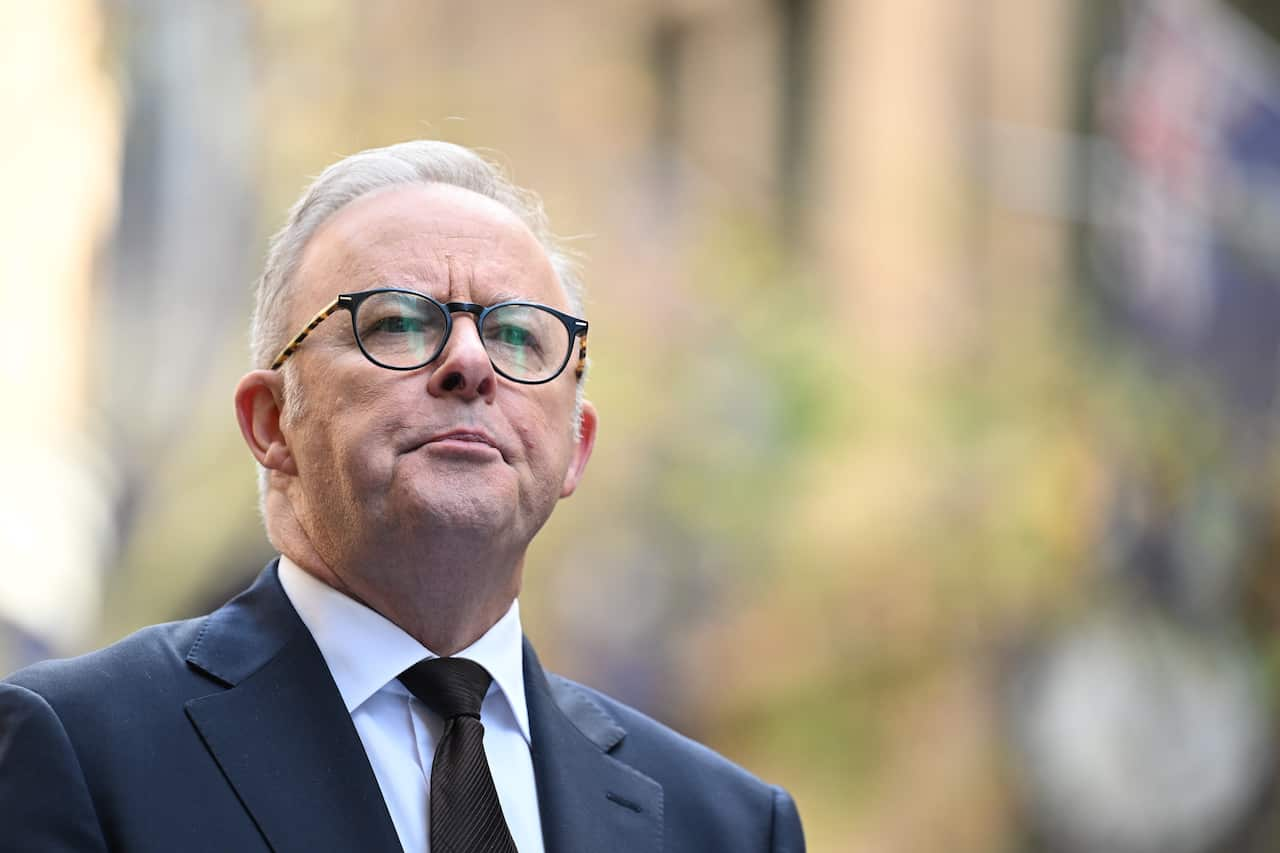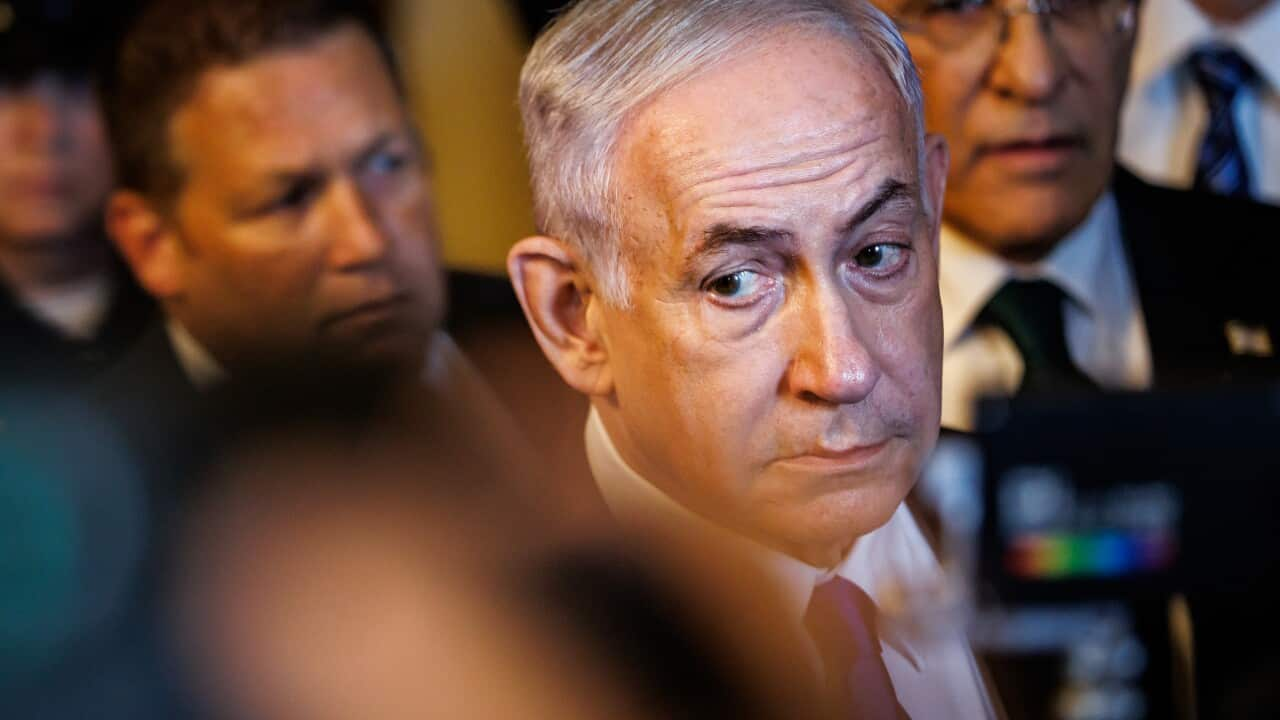Key Points
- Benjamin Netanyahu has continued to attack Prime Minister Anthony Albanese.
- In an interview on Thursday evening, the Israeli prime minister reiterated his view that Albanese was "weak".
- Albanese has joined multiple other countries in committing to recognising a Palestinian state next month.
Israeli Prime Minister Benjamin Netanyahu has reiterated his view that Prime Minister Anthony Albanese showed "weakness" when he committed to recognising a Palestinian state and has accused Western nations of "rewarding" Hamas with this decision.
In an interview with Sky News' Sharri Markson on Thursday evening, Netanyahu accused Western nations that have committed to recognising a Palestinian state of "appeasing" Hamas.
"I think his record is forever tarnished by the weakness that he's shown in the face of these Hamas terrorist monsters," he said, referring to Albanese.
Netanyahu said the decision of Western nations, such as Australia, France and the UK to recognise a Palestinian state is tantamount to "rewarding" Hamas and would only encourage extremism in those countries.
He criticised what he described as a lack of action against antisemitic acts in Western nations and referred to recent incidents in Sydney and Melbourne.
"These are horrible things, and if you don't stop them when they're small, they get bigger and bigger and bigger and ultimately they consume your society," he said.
When asked about widespread starvation in Gaza, Netanyahu denied the claims and said they were "the same lies that were levelled at the Jewish people in the Middle Ages".
"What lies, I mean, we brought in two million tonnes of food into Gaza since the start of the war," he said.
The UN-backed Integrated Food Security Phase Classification (IPC) is now warning that the "worst-case famine scenario" is unfolding on a population of 2.1 million.
Humanitarian groups such as Oxfam, Médecins Sans Frontières and Save the Children International signed a joint statement in June, accusing Israel of "deliberately and systematically" dismantling the system for humanitarian aid to enter Gaza.
Last year, the International Criminal Court (ICC) issued arrest warrants for Israeli Prime Minister Benjamin Netanyahu, his former defence chief Yoav Gallant and Hamas leader Ibrahim al-Masri, also known as Mohammed Diab.
Netanyahu and Gallant are accused of using starvation as a method of warfare and intentionally directing attacks against civilians in Gaza. Israel has denied all accusations of committing war crimes in Gaza.
Gaza's health ministry said on Thursday that two more people had died of starvation and malnutrition in Gaza in the past 24 hours, raising the number of Palestinians who have died from such causes to 271.
Israel disputes malnutrition and starvation figures posted by the Gaza health ministry.
Diplomatic tensions
Diplomatic ties between Australia and Israel hit an all-time low this week after the federal government denied a visa to far-right Israeli politician Simcha Rothman from entering the country for a speaking tour, following provocative comments.
Israel retaliated by cancelling the visas of three Australian diplomats who cover the Palestinian Authority, a decision Foreign Minister Penny Wong said was "unjustified".
It came after Netanyahu earlier called Albanese a "weak politician" over his decision to recognise a Palestinian state.
Earlier this week, Home Affairs minister Tony Burke hit back, saying strength was "not measured by how many people you can blow up or how many children you can leave hungry".
Burke said Israel was increasingly isolated on the international stage, after Albanese said last week that Netanyahu was "in denial" about the humanitarian situation in Gaza.

When asked on Thursday evening if Australia's relationship with Israel could be repaired, Netanyahu said that despite recent diplomatic rifts, there is a "great underlying friendship" between the two nations.
However, he said the relationship has gone off track because Western leaders were not showing "strength and conviction".
Netanyahu says negotiations resuming as Israel bombards Gaza City
Netanyahu's comments came as the Israeli military maintains pressure on Gaza City with heavy bombardments ahead of an offensive to seize the enclave's largest city, despite widespread international condemnation.
The military has called up 60,000 Israeli reservists, and on Thursday, said it had begun "the preliminary operations and the first stages of the attack on Gaza City".
Netanyahu said on Thursday that Israel would immediately resume negotiations for the release of all hostages held in Gaza and an end to the nearly two-year-old war, but on terms acceptable to Israel.
It was Netanyahu's first response to a temporary ceasefire proposal put forward by Egypt and Qatar that Hamas accepted on Monday. Israel will dispatch negotiators to talks once a location is set, an Israeli official said.
Speaking to soldiers near Israel's border with Gaza, Netanyahu said he was still set on approving plans for defeating Hamas and capturing Gaza City, the densely populated centre at the heart of the Palestinian enclave.
Thousands of Palestinians have left their homes as Israeli tanks have edged closer to Gaza City over the last 10 days.
"At the same time, I have issued instructions to begin immediate negotiations for the release of all our hostages and an end to the war on terms acceptable to Israel," he said, adding: "We are in the decision-making phase."
The crisis in Gaza started after Hamas' October 7 attack on Israel, in which 1,200 people were killed and more than 250 taken hostage, according to Israeli tallies.
More than 60,000 people have been killed in Gaza since October 2023, according to the health ministry in Gaza, and much of the population has been displaced.
— With additional reporting by the Australian Associated Press and Reuters
For the latest from SBS News, download our app and subscribe to our newsletter.

